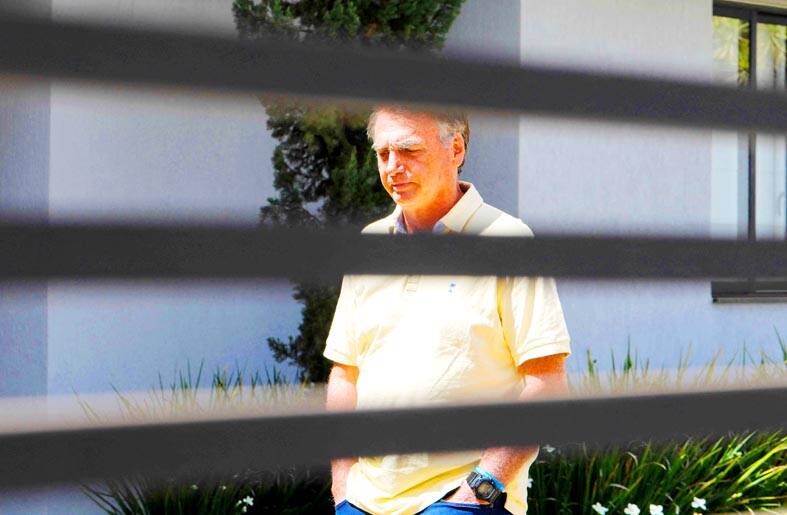The Brazilian Supreme Court on Tuesday ordered former Brazilian president Jair Bolsonaro to begin serving a 27-year sentence for plotting a failed coup after he exhausted all appeals.
Bolsonaro, 70, was convicted in September over a scheme to stop Brazilian President Luiz Inacio Lula da Silva from taking office after the 2022 election.
Prosecutors said the scheme failed only due to a lack of support from military top brass.

Photo: AFP
The court rejected an appeal to his sentence earlier this month and on Tuesday ruled that the judgement was final.
The court also ordered a military tribunal to decide whether Bolsonaro should be stripped of his captain’s rank.
Bolsonaro had been under house arrest until Saturday, when he was detained at police headquarters in the capital, Brasilia, for tampering with his ankle monitor using a soldering iron.
Supreme Court Justice Alexandre de Moraes said that there were signs Bolsonaro was planning to flee during a planned vigil organized by his son outside his home.
The justice pointed to the location of the nearby US embassy and Bolsonaro’s relationship with US President Donald Trump, suggesting that he might have tried to escape to seek political asylum.
Bolsonaro said he had acted from “paranoia” induced by medications he was on and denied trying to escape.
The court ruled that he would remain detained in the officers’ room — a secure space for protected prisoners — where he is in Brasilia.
Five others, including military generals and former ministers, also began serving sentences on Tuesday of between 19 and 26 years.

The US government has signed defense cooperation agreements with Japan and the Philippines to boost the deterrence capabilities of countries in the first island chain, a report by the National Security Bureau (NSB) showed. The main countries on the first island chain include the two nations and Taiwan. The bureau is to present the report at a meeting of the legislature’s Foreign Affairs and National Defense Committee tomorrow. The US military has deployed Typhon missile systems to Japan’s Yamaguchi Prefecture and Zambales province in the Philippines during their joint military exercises. It has also installed NMESIS anti-ship systems in Japan’s Okinawa

‘WIN-WIN’: The Philippines, and central and eastern European countries are important potential drone cooperation partners, Minister of Foreign Affairs Lin Chia-lung said Minister of Foreign Affairs Lin Chia-lung (林佳龍) in an interview published yesterday confirmed that there are joint ventures between Taiwan and Poland in the drone industry. Lin made the remark in an exclusive interview with the Chinese-language Liberty Times (the Taipei Times’ sister paper). The government-backed Taiwan Excellence Drone International Business Opportunities Alliance and the Polish Chamber of Unmanned Systems on Wednesday last week signed a memorandum of understanding in Poland to develop a “non-China” supply chain for drones and work together on key technologies. Asked if Taiwan prioritized Poland among central and eastern European countries in drone collaboration, Lin

BACK TO WORK? Prosecutors said they are considering filing an appeal, while the Hsinchu City Government said it has applied for Ann Kao’s reinstatement as mayor The High Court yesterday found suspended Hsinchu mayor Ann Kao (高虹安) not guilty of embezzling assistant fees, reducing her sentence to six months in prison commutable to a fine from seven years and four months. The verdict acquitted Kao of the corruption charge, but found her guilty of causing a public official to commit document forgery. The High Prosecutors’ Office said it is reviewing the ruling and considering whether to file an appeal. The Taipei District Court in July last year sentenced Kao to seven years and four months in prison, along with a four-year deprivation of civil rights, for contravening the Anti-Corruption

NO CONFIDENCE MOTION? The premier said that being toppled by the legislature for defending the Constitution would be a democratic badge of honor for him Premier Cho Jung-tai (卓榮泰) yesterday announced that the Cabinet would not countersign the amendments to the local revenue-sharing law passed by the Legislative Yuan last month. Cho said the decision not to countersign the amendments to the Act Governing the Allocation of Government Revenues and Expenditures (財政收支劃分法) was made in accordance with the Constitution. “The decision aims to safeguard our Constitution,” he said. The Constitution stipulates the president shall, in accordance with law, promulgate laws and issue mandates with the countersignature of the head of the Executive Yuan, or with the countersignatures of both the head of the Executive Yuan and ministers or